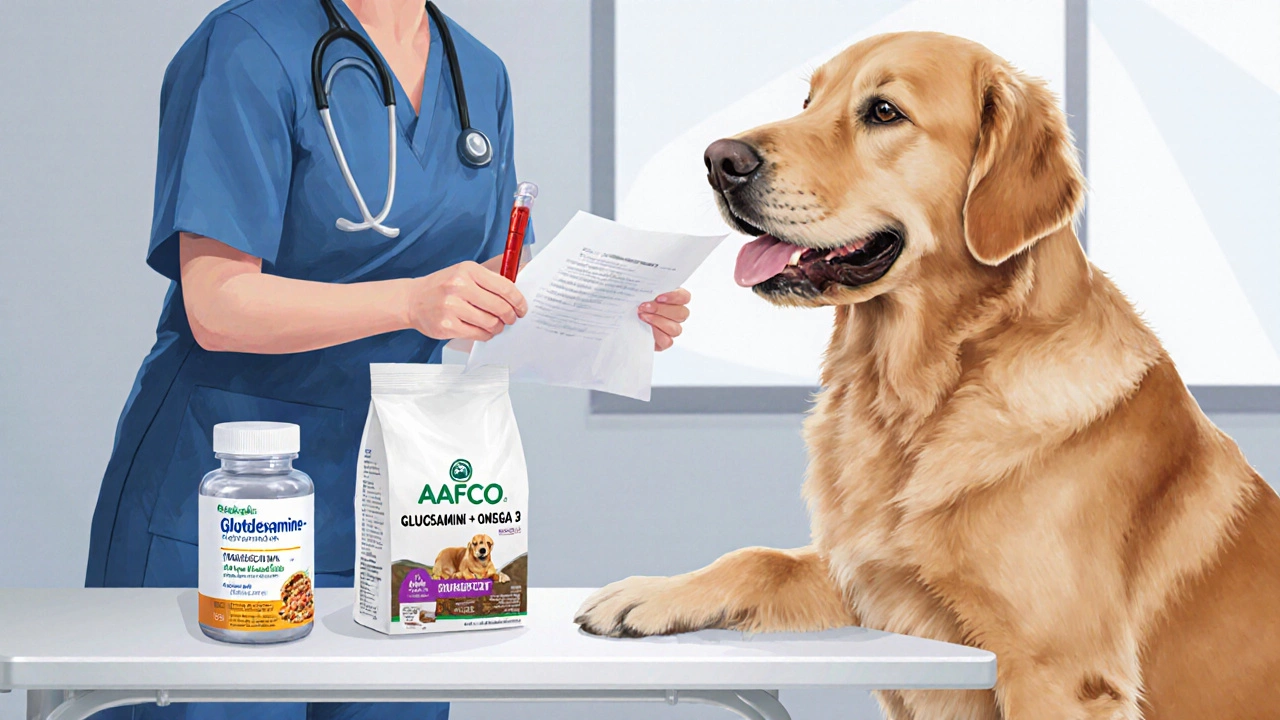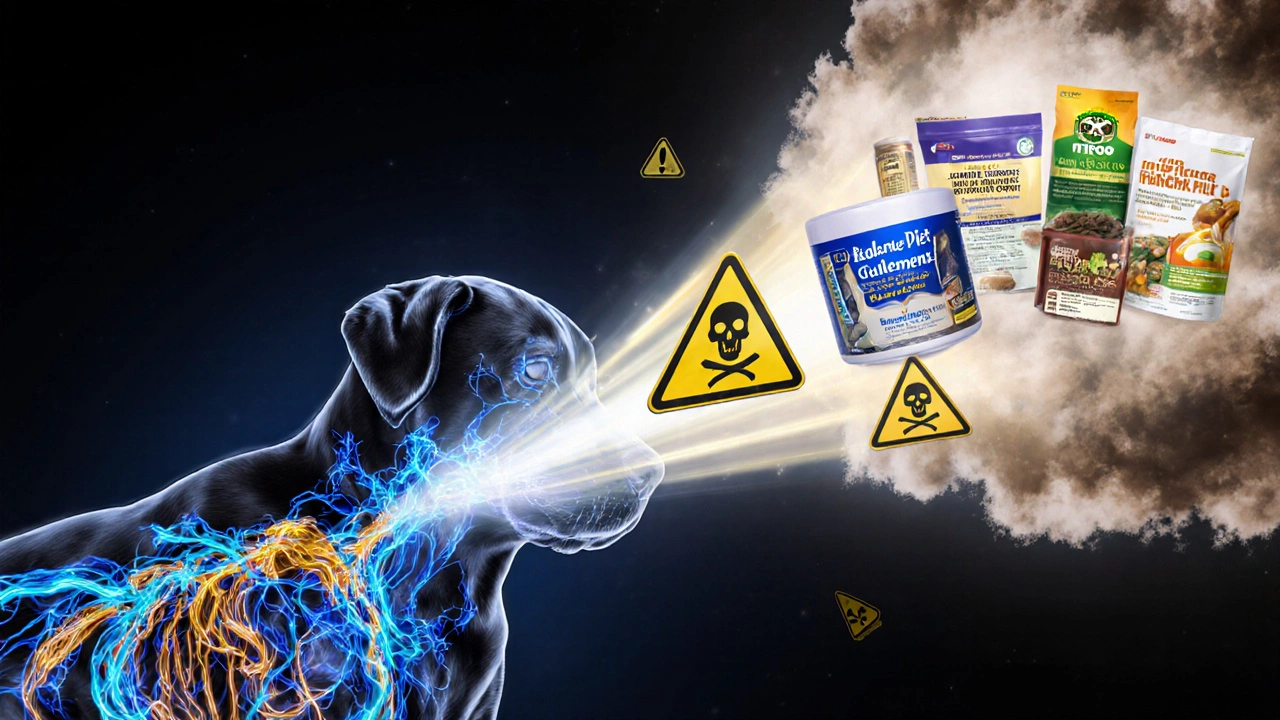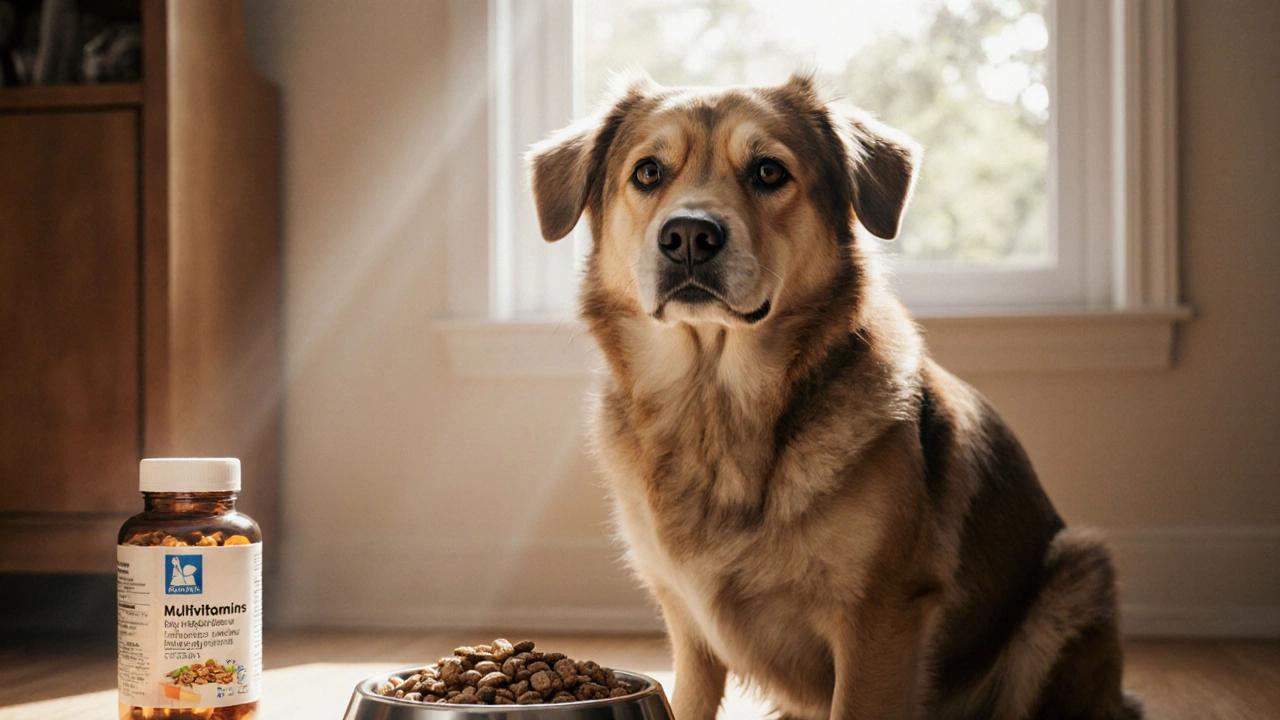Most dog owners think giving their pup a multivitamin is a safe way to cover all the bases. But here’s the truth: your dog doesn’t need vitamins just because you give them to yourself. In fact, giving the wrong ones can hurt more than help. So how do you actually know what vitamins your dog needs? It’s not about guessing. It’s about understanding their diet, their health, and what their body is telling you.
Most dogs don’t need extra vitamins at all
If your dog eats a complete and balanced commercial dog food-whether it’s kibble, canned, or freeze-dried-they’re already getting all the vitamins they need. The Association of American Feed Control Officials (AAFCO) sets strict standards for dog food. Brands that meet those standards include the right amounts of vitamin A, D, E, K, B-complex, and minerals like zinc and calcium. No gaps. No extras. Just what a dog needs to thrive.
Think of it like this: you wouldn’t give your child a daily multivitamin if they ate a balanced diet. Same goes for your dog. The idea that more vitamins = better health is a myth pushed by supplement marketers. In reality, excess vitamins can build up in your dog’s body and cause real problems. Too much vitamin D? Kidney damage. Too much calcium? Bone growth issues in puppies. Too much vitamin A? Joint pain and dry skin.
When your dog actually might need supplements
There are times when a vet might recommend vitamins or supplements. But it’s never random. It’s always tied to a specific condition or dietary gap.
- Home-cooked or raw diets: If you’re feeding your dog homemade meals, you’re likely missing key nutrients. Calcium, vitamin D, and certain B-vitamins are hard to get right without precise ratios. A vet or canine nutritionist can help you balance it.
- Older dogs with joint pain: Glucosamine and chondroitin aren’t vitamins, but they’re often paired with omega-3s to reduce inflammation. These are common in senior dogs with arthritis.
- Dogs with skin or coat issues: Omega-3 fatty acids from fish oil can help with dry skin and shedding. This isn’t a vitamin, but it’s a supplement many vets suggest.
- Chronic illness or recovery: Dogs with liver disease, kidney problems, or after surgery might need specific B-vitamins or antioxidants like vitamin E to support healing.
Here’s the key: none of these are for healthy dogs on commercial food. If your dog is eating well, pooping normally, has shiny fur, and acts like their normal self, they’re probably getting everything they need.
Signs your dog might be deficient
Deficiencies are rare in dogs on balanced diets. But if you notice these signs, it’s time to see a vet-not buy a supplement off Amazon.
- Dull, brittle coat or excessive shedding: Could point to omega-3 or zinc deficiency, but also to allergies or thyroid issues.
- Loss of appetite or weight loss: Not a vitamin problem. This is a red flag for illness.
- Weakness or stumbling: Could be low potassium, low vitamin B12, or something serious like kidney disease.
- Diarrhea or vomiting that won’t quit: Gut issues affect nutrient absorption. Fix the gut first.
- Seizures or muscle tremors: These are medical emergencies. Not a vitamin issue. Get to a vet now.
None of these are signs you should try to fix with a bottle from the pet store. They’re signs your dog needs a full vet checkup, blood work, and maybe a diet review. Jumping to supplements is like putting a bandage on a broken leg.

What to look for (and avoid) in dog supplements
If your vet says your dog needs something, here’s how to pick the right one.
Good signs:
- Formulated for dogs (not humans)
- Lists exact amounts of each ingredient
- Has a National Animal Supplement Council (NASC) seal
- Recommended by your vet
Red flags:
- Claims like "boosts immunity" or "cures arthritis"
- Contains human vitamins like vitamin C or D in high doses
- No ingredient list or vague terms like "proprietary blend"
- Sells itself as a "natural alternative" to vet-prescribed meds
There’s no regulation on pet supplements like there is on pet food. That means anyone can sell anything. A 2023 study from the University of California found that nearly 40% of dog supplements on the market didn’t contain the ingredients listed on the label. Some had harmful fillers. Others had too much of a vitamin and caused toxicity.
How to talk to your vet about supplements
Don’t just show up with a bottle and ask, "Should I give this?" Instead, come prepared.
- Bring your dog’s current food bag or a photo of the ingredient list.
- Write down any symptoms you’ve noticed-when they started, how often they happen.
- Ask: "Could this be a nutrient deficiency?" and "What tests should we run?"
- Ask for a specific recommendation: "What brand and dose do you trust?"
Good vets won’t push supplements. They’ll ask questions first. If they immediately suggest a brand, that’s a red flag. The best ones will say, "Let’s check blood levels first," or "Let’s adjust the diet before adding anything."

What about grain-free, raw, or organic diets?
These trends sound healthy, but they’re not automatically better. Grain-free diets were linked to a serious heart condition called DCM in dogs, according to the FDA’s 2021 report. Raw diets can carry harmful bacteria like Salmonella and E. coli. Organic food doesn’t mean it’s nutritionally complete.
Switching your dog’s diet without professional guidance is the #1 reason dogs end up with vitamin imbalances. If you want to try something new, talk to a board-certified veterinary nutritionist. They’re the only ones trained to design safe homemade diets.
Your dog’s best vitamin is good food and regular checkups
There’s no magic pill. No secret formula. The best thing you can do for your dog’s health is feed them a quality, balanced food and take them to the vet once a year. Blood tests, weight checks, and dental exams catch problems before they become emergencies.
Supplements are tools-not crutches. They’re for dogs with diagnosed needs, not for dogs whose owners just want to feel like they’re doing more. Your dog doesn’t need you to overthink it. They need you to be steady, observant, and willing to listen to a professional when it counts.
Watch your dog. Listen to your vet. Skip the hype. And remember: the healthiest dog isn’t the one with the most bottles in the cupboard. It’s the one eating well, moving freely, and looking you in the eye like they know you’ve got their back.
Can I give my dog human vitamins?
No. Human vitamins are formulated for our bodies, not dogs. Many contain ingredients like xylitol, iron, or vitamin D in doses that can be toxic to dogs. Even something as simple as a children’s chewable multivitamin can cause poisoning. Always use supplements made specifically for dogs and only under veterinary guidance.
Do puppies need different vitamins than adult dogs?
Puppies don’t need extra vitamins if they’re eating puppy-formulated food that meets AAFCO standards. Their needs are higher for growth-especially calcium and phosphorus-but these should come from balanced food, not supplements. Adding extra calcium can cause skeletal deformities in large-breed puppies. Always stick to food designed for their life stage.
Are natural or organic dog vitamins better?
"Natural" and "organic" are marketing terms, not nutritional ones. They don’t mean the product is safer or more effective. What matters is whether the supplement contains the right nutrients in the right amounts, is free from contaminants, and is backed by research. Many "natural" supplements lack proper dosing or contain inconsistent ingredients. Stick to brands with NASC certification and vet approval.
How long does it take to see results from dog vitamins?
If your dog has a true deficiency and you’re giving the right supplement, you might see small improvements in coat quality or energy in 4-6 weeks. But if you’re not seeing changes, it’s likely because there was no deficiency to begin with. Don’t keep giving supplements hoping for results. Revisit your vet if nothing changes after two months.
Can too many vitamins hurt my dog?
Yes. Fat-soluble vitamins like A, D, E, and K build up in the body and can cause toxicity. Symptoms include vomiting, loss of appetite, weakness, and even organ damage. Overdosing on calcium or zinc can lead to bone problems or interfere with absorption of other minerals. Always follow your vet’s dosage. More is never better.
If you’re unsure whether your dog needs supplements, the safest answer is always: wait. Talk to your vet. Run the tests. Don’t guess. Your dog’s health isn’t a supplement experiment-it’s a long-term partnership. Get it right, and they’ll thank you with years of wagging tails and happy walks.
